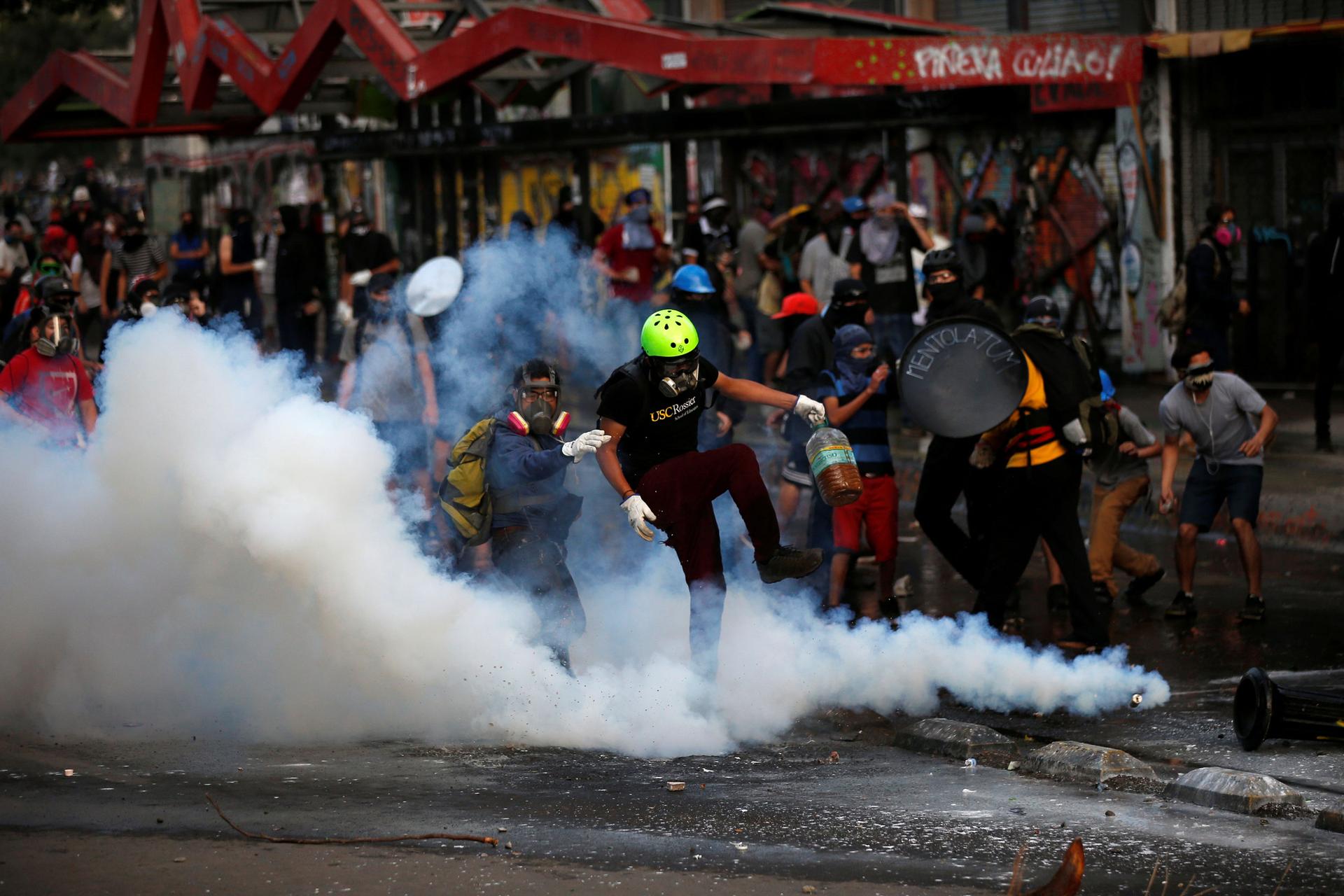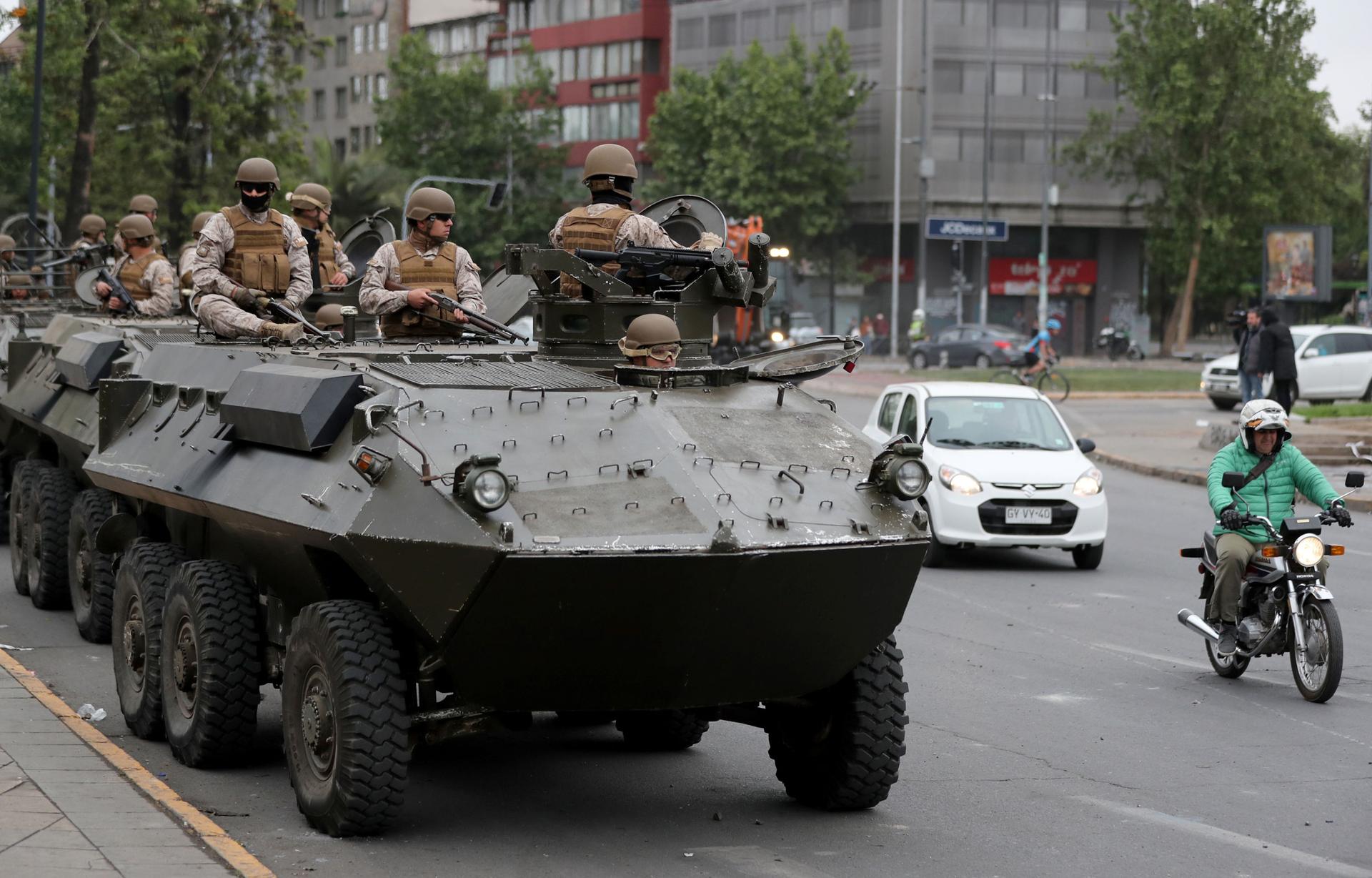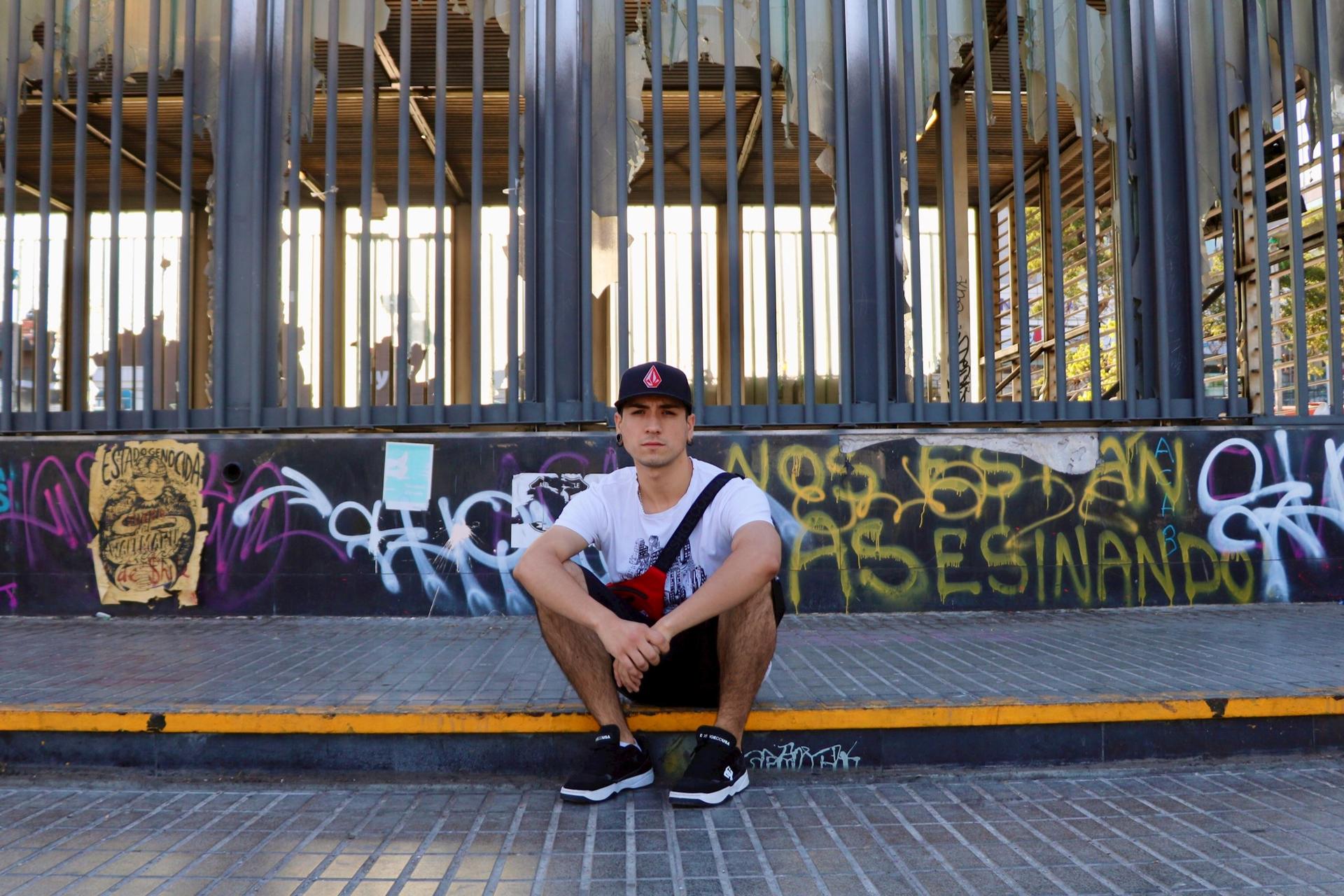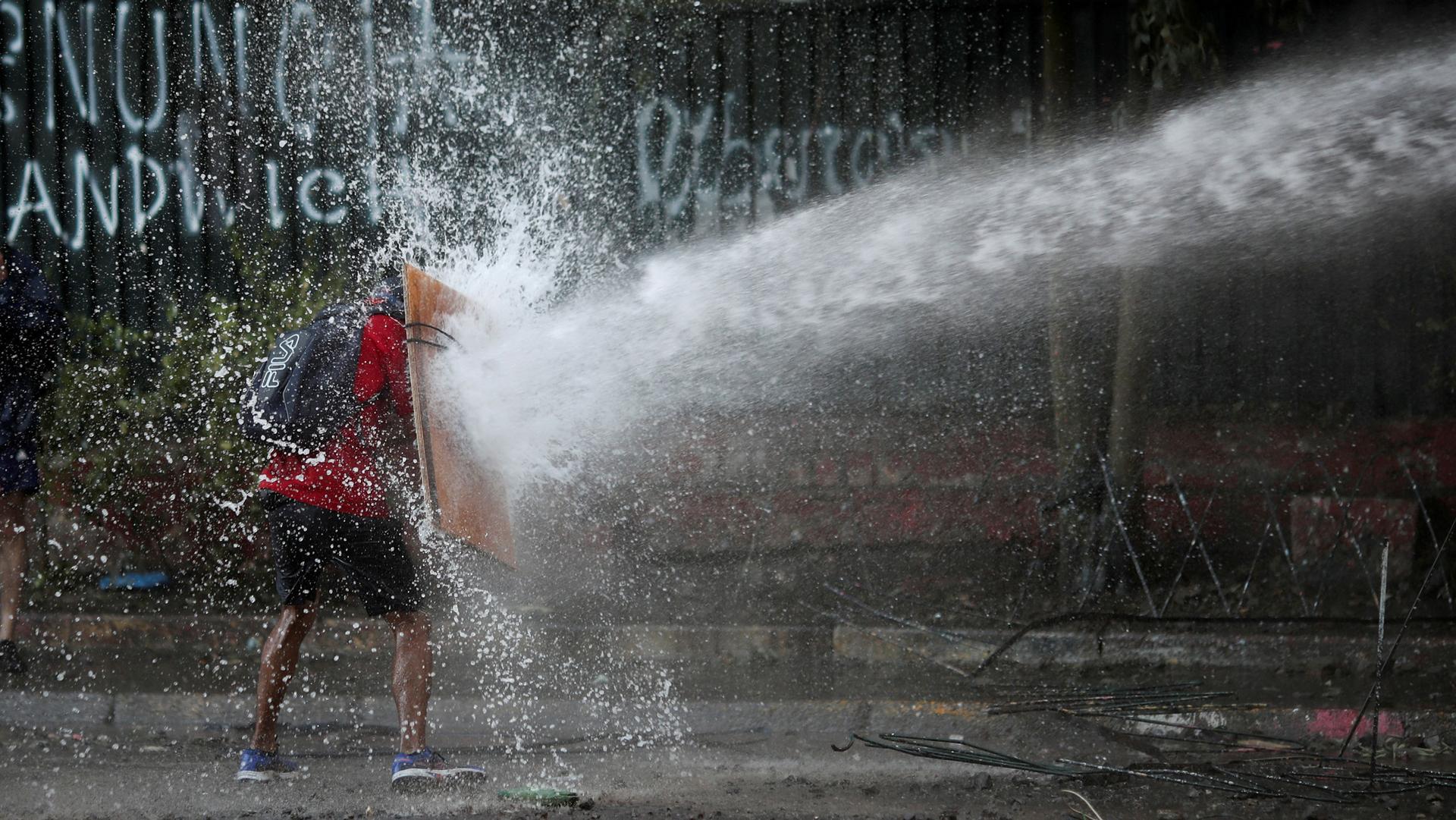Amid unrest and rights abuses, Chile protesters say ‘there’s no turning back’
“There’s no turning back now,” says 23-year-old history student Frank Araneda, his dark eyes shaded by a baseball cap in the evening sun in Maipú, a low-income neighborhood outside of Santiago.
“Chile will never go back to how it was before, and that’s a good thing,” he says. “It’s time we rebuilt society with different principles at its core — ones that represent all of us.”
For the last two months, Chile has been trapped in a wave of social unrest on a scale not seen since its transition to democracy in 1990. Violent unrest exploded across the capital Oct. 18. By the following morning, Chile seemed to have united in pursuit of a common goal: dignity in a country where the cost of living has become unaffordable for the majority. Just a week later, more than 1 million people gathered in Santiago’s Plaza Italia as the calls for change grew deafening.
President Sebastián Piñera declared a state of emergency across much of the country as night-time curfews were enforced by the military, which was called upon in an attempt to restore order. The president also declared that Chile was “at war with a violent enemy,” and a wave of brutal repression followed.
Related: Photos:Chile’s Piñera extends state of emergency, says ‘we are at war’
The protests have left 23 people confirmed dead in the last two months and nearly 3,500 injured, according to Chile’s human rights commission. On Friday, the UN accused the Chilean police and armed forces of committing serious human rights violations.
In response to protesters’ demands, the Piñera administration has made several reforms, including a subsidized increase to Chile’s minimum wage and an increase to pensions. But healthcare and education remain priorities for the thousands who still take to the streets every Friday night.

Rejecting entrenched inequalities
Residents beat pots and pans in a cacophonous rejection of the social inequalities entrenched by the economic model set in place by Chile’s dictatorship from 1973 to 1990. During the 1970s, Chile became a laboratory for neoliberal policies, implementing a “shock doctrine” in response to an economic downturn that saw University of Chicago economists, led by Milton Friedman, hold significant sway in the implementation of a dogmatic free-market approach. The dictatorship created an economic elite that is perceived to have become so far detached from the reality of life in Chile that people have finally woken up to the abuses they are suffering in terms of wealth and resource accumulation.
Related: Mapuche Indigenous people in Chile take down symbols of Spanish colonization
Araneda is one of these Chileans. His university classes take place only sporadically, so he says he has committed himself fully to Chile’s revolutionary moment.
On most evenings, he hitchhikes or takes a two-hour bus ride from Maipú, where he lives with his mother, to join fellow protesters in Plaza Italia. The community’s metro station was destroyed amid a wave of vandalism during the first protests and is not scheduled to reopen for more than a year, severing the main transport link to the capital.
On the road running alongside Maipú’s main square, Araneda points out scorched craters in the tarmac, where makeshift barricades had been lit to disrupt traffic. The occasional breeze lifts the acrid residue of tear gas into the air, causing commuters to splutter and sneeze.
“Maipú is a place of contrasts … a microcosm of the problems facing Chile. There are parts of the district where people have nothing and fight to survive, but in other areas they have swimming pools and gardens.”
“Maipú is a place of contrasts …a microcosm of the problems facing Chile,” he says. “There are parts of the district where people have nothing and fight to survive, but in other areas they have swimming pools and gardens.”
Around the fringes of peaceful demonstrations, protesters throw rocks that hail onto police, who have been responding with brutal repression. Violent bouts of looting and vandalism have plagued parts of the country, with the peripheral areas of Santiago worst affected, including Maipú. Araneda says that he knows families in the neighborhood that have lost almost everything in raids.

Despite already constituting a criminal offense under national law, a congressional vote passed a controversial law on Dec. 4 that would enact a raft of draconian punishments for raiding businesses, building barricades and throwing stones. It has since been rejected by the Senate, whose members say it must be reconsidered.
Nonetheless, demonstrators say they remain undeterred.
“…we are living through a historic change — we want to roll back decades of abuses and leave a violent and unjust economic model firmly in the past.”
“The government has criminalized our movement and is treating us all as lawbreakers and agitators,” said 27-year-old protester Humberto Jiménez through a billowing cloud of smoke in Plaza Italia one recent evening. “But we are living through a historic change — we want to roll back decades of abuses and leave a violent and unjust economic model firmly in the past.”
The model in question has bestowed Chile with a glowing international reputation for prosperity, affording it the image of a regional outlier surrounded by beleaguered economies and civil unrest.
Indeed, just a week before the crisis began, Piñera gave an unfortunately timed interview in which he praised Chile’s position as an “oasis” amid Latin America’s chaos. Chile’s economic elite are not wrong when they wax poetic about the country’s favorable economic indicators: the country boasts the highest GDP per capita in Latin America.
Related: How ‘cacerolazos’ became the symbol of Colombia’s anti-government protests
“The economic history of Chile is defined by mining and agriculture, two sectors which require large workforces and are therefore profoundly hierarchical — and this is reflected in society,” explains historian Sol Serrano.
While these two sectors still form important pillars of the national economy, little has been done to redistribute national income in the form of social welfare. Post-tax income inequality is the highest among the Organisation for Economic Co-operation and Development (OECD) bloc of developed countries, of which Chile is a member. Consumer prices are high, while wages are pitiful compared to the rising cost of living. Chile’s National Statistics Institute states that half of the country’s workers earn a salary of 400,000 pesos ($520) per month or less.
Insurmountable debts, high cost of living
Indeed, the rising cost of living has proved the main catalyst for the ongoing protest movement. On Oct. 6, high school and university students gathered at metro stations nationwide to protest a rise in rush hour metro fares which put them among the most expensive metro tickets in Latin America.
What’s more, the government hiked electricity tariffs by 10.5 percent at the start of October — a rise it has since rescinded, resetting prices to those of the beginning of the year — while drug prices are among the highest in the region. Exorbitant tuition fees limit access to higher education, and many Chileans are forced to run up insurmountable debts in order to study, pay basic living costs and make ends meet.

“Look, I’m one of the lucky ones,” says Araneda, stopping in front of the reinforced bars shuttering the entrance to Maipú’s metro station. He references earlier protests eight years ago which gave rise to the current generation of young opposition politicians and resulted in modest systemic reforms. “Because of the education protests in 2011, I have been able to study for free. But in general, access to education is as unequal as everything else in Chile.”
Nor is there any dignity to be found in retirement. Many feel that they have been failed by a contributory pension system which left retirees with a base monthly pension of 110,201 pesos ($140) at the outset of the movement. The amount barely covers living costs and increases reliance on an already stretched state healthcare system, so several generations often live together in order to save money. The highest suicide rate for any sector of Chilean society is among those aged 80 and above.
A slogan daubed on the wall of a building in central Santiago reads, “It wasn’t depression — it was just capitalism.”
“The government is not listening to us as the reforms do not go nearly far enough.”
“The government is not listening to us as the reforms do not go nearly far enough,” Jiménez said. “There have been more than 20 deaths resulting from brutal repression, and the only real answers they have come up with have been shallow reforms that will end up giving yet more money to private business.”
Chile remains in an uncomfortable limbo between hope that change can be achieved and uncertainty over what the future might hold.
“Happiness is coming!” was the message splashed across billboards and posters throughout Chile as the country prepared to vote in a nationwide referendum in the spring of 1988, which eventually brought about the end of the dictatorship.
Now, after more than 30 years of democracy, Chileans are asking why the happiness they were promised never truly arrived.
